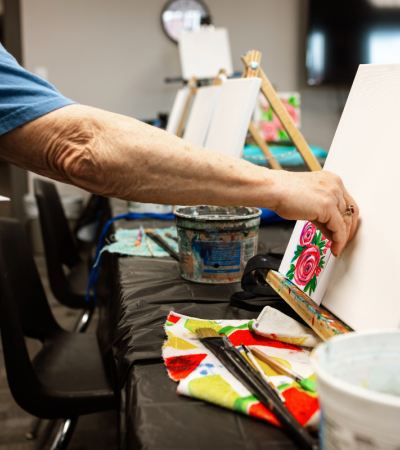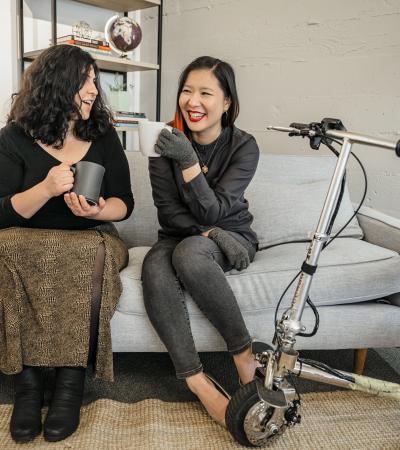Libraries are ideal hosting sites for Memory Cafés. We recently conducted a case study of the Vinton (Iowa) Public Library’s Memory Café, which is funded through the ALA’s Libraries Transforming Communities: Accessible Small and Rural Communities grant. On the basis of their experiences, in what follows, we offer a how-to guide for libraries interested in creating their own Memory Cafés. Importantly, there is no one “right way” to do these programs. To be effective, Memory Cafés must be responsive to the needs and interests of individual communities. Nevertheless, Memory Cafés are grounded in a shared set of guiding principles. They are free to attend, are hosted in public settings, and seek to provide a stigma-free environment in which participants can share their struggles, learn, and enjoy each other’s company through activities and conversation that uphold dignity and privacy of people living with dementia.
Steps to Getting Started

Familiarize Yourself With What’s Already Happening in Your Area
Before creating a Memory Café, it’s important to assess what’s already going on in your community in terms of dementia-friendly programs or initiatives. As Vinton Library director Kelly Henkle explains, instead of duplicating existing services, the goal should be to “find those gaps of needs that aren't being met.” At the start of their process, staff at the Vinton Library made use of their connections with Dementia Friendly Vinton and the Chris & Suzy DeWolf Innovation Center for Aging & Dementia to identify these gaps. Along with this, conversations with the local Lutheran home (which hosts a group called “Coping with Dementia over Coffee and Donuts”) revealed that while Vinton offered opportunities for the family members of individuals with dementia to connect, there was nothing specifically for people with dementia who are still living in their own homes.
To familiarize yourself with what’s already happening in your area, check the Memory Café Directory to see if there are other cafes being held nearby. If so, the hosts may be able to talk with you about their experience or invite you to observe a meeting. You can also consult local healthcare providers or community organizations like Area Agencies on Aging or local Alzheimer's Association chapters to learn about what’s being offered in your area.
Talk to Community Members About their Needs and Preferences
In addition to learning about the broader ecosystem of dementia care in your community, before getting started, it’s also important to hear from people with dementia and their caregivers. After receiving an LTC grant, the Vinton Library hosted a community conversation to solicit public feedback on their plans. From this conversation, staff learned about the day-to-day challenges people with dementia confront. Hearing about some of the ways that people with dementia are “often invisible, if not completely ignored” (as one caregiver put it) gave the library confidence that their efforts would be well-received and impactful. Discussions also helped the library figure out what their goals for the program would be (in their case, reducing the social isolation that comes with dementia and countering some of the stigmas surrounding it). And on a more practical note, community input helped the library discover and work around the scheduling barriers that sometimes prevent people with dementia and their caregivers from attending programs such as Memory Cafés.
To gather input from your community, you can begin by reaching out to people with dementia or caregivers you’re already aware of. Talk to them about what they’d want to do at a Memory Café, and when they'd be able to attend. If you don’t know anyone, engage local healthcare providers, agencies on aging, or Alzheimer’s Association partners. You could also host a community conversation at your library, or conduct a patron survey.
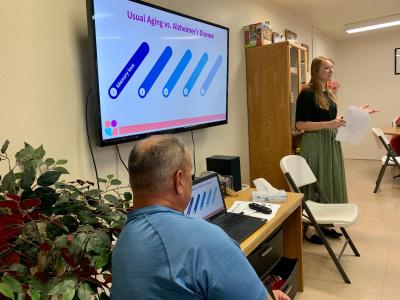
Train Staff and Volunteers
The Vinton Library’s success in hosting a Memory Café has in no small way owed to the support they received from Dementia Friendly Vinton – a local organization (which is part of the larger Dementia Friendly America network) whose training program helps businesses and individuals bring “a little more empathy and understanding” into their interactions with people with dementia. As a caregiver who participates in Vinton’s Memory Café puts it, dementia is “very abstract for a lot of people,” and because of this, “there can be a lot of minimizing or dismissing of people with dementia.” Getting formal training makes things more concrete, because its goal is to help participants better recognize the signs of dementia. Training also shows people how to engage people with dementia in ways that make them feel “involved and part of the community.”
A great place to start when looking for training opportunities is Dementia Friends USA, which offers in-person sessions in many states as well as free online materials. Community partners will also be able to provide information on how to best support people living with dementia when they visit the library.
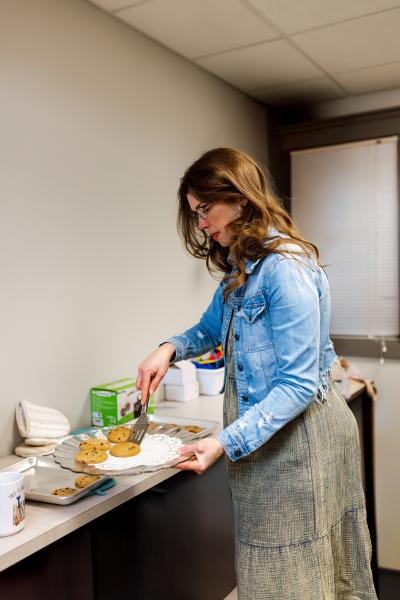
Ensure that Your Library’s Space is Dementia Friendly
The process of becoming dementia-friendly is as much about space as it is programs and services. In order to successfully participate in a Memory Café, people with dementia and their caregivers need to feel comfortable navigating the library. As part of the training they received, staff at the Vinton Library learned about different interior design features that can be physical obstacles for people with dementia. Henkle also attended an event at the University of Northern Iowa that offered practical suggestions on dementia-friendly facility planning. As a result of this, the library upgraded its interior signage to better direct patrons to their restrooms, elevator, and other key locations.
Memory triggers can also be part of creating dementia-friendly environments. When participants enter the Vinton Library, they’re greeted by the smell of warm cookies and fresh coffee — smells that are meant to trigger positive memories and associations.
Be Flexible with Programming and Attendance
While activities and discussion topics should be planned based on participants' interests, it’s important to bear in mind that not everything will resonate with everyone. Given this, the best approach is to come with a variety of options. As Vinton library assistant Lisa Hopkins explains, “we have to find their interests.”
The Vinton Library’s Memory Café always starts with casual conversation, which is followed by the sharing of resources on living with dementia and themed activities. On occasion, the library also brings in guest speakers. Giving participants multiple ways of benefiting from the program has been key to the Memory Café’s success. As an example of this, Henkle shares the following story:
"We had someone come who was not sure exactly if it was right for them. They were unsure how to participate. They were pretty quiet, and we were all chatting, and we would ask questions and attempt to engage them in conversation. And then we brought out the games, and they completed the crossword so fast it shocked me, and it was wonderful to see a lightbulb moment for them, where they saw something that they loved, and had an opportunity to do it…The smile on their face when they completed it, and the pride that they had was just contagious."
Adding to this, library assistant Lisa Hopkins remembers that after completing the crossword, this participant “started talking…and opening up…and sharing with the group.” It was almost as if “there was a word within this puzzle that triggered something.”
Flexibility around attendance is important too. People may need to arrive late, leave early, or bring children or service animals with them. A caregiver who attends the Vinton Library’s Memory Café notes that one of the things that has made this program successful is the fact that staff are “pretty laid back” about letting their children attend. “They just kind of take it in stride and include them in whatever if they’re in there,” the caregiver explains.
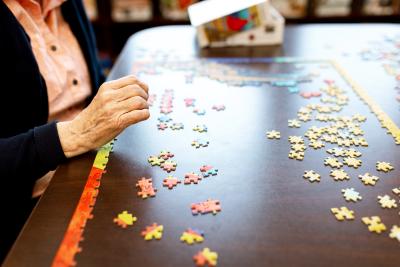
Empower Participants
One of the things that makes Memory Cafés valuable is the opportunity they present for distributing and discussing resources on living with dementia. At the Vinton Library, participants regularly receive handouts on topics like “how to have the best sleep when living with dementia” from the Alzheimer’s Association.
But as experts on living with and caring for people with dementia, participants also have valuable knowledge and guidance to impart. Memory Cafés are a forum in which that expertise can be recognized and shared. By opening a space where people talk about how they’re managing their diagnoses and exchanging helpful information and advice, libraries can empower people with dementia and their caregivers. Hopkins offers an example of how this typically works at the Vinton library:
"We can open up with a recap of the day, of how their last two weeks have gone. And it can go from, you know, 'I'm struggling, I can't wake up in the morning. I want to get going, but I don't have the energy.' And then another person will say, 'you know, I have the same thing. But I found that if I set the alarm for it or have music playing, then I'm able to get up a little better.'"
Explaining the Vinton Library’s general approach, Hopkins adds that “we are very open to keeping it moving forward, but being open to allowing people to discuss.”
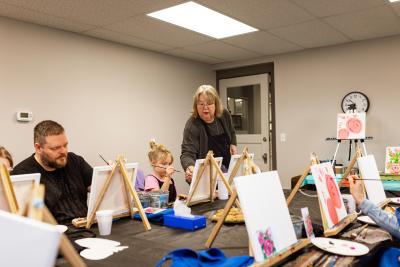
Make it Fun!
Part of the reason Memory Cafés work is that they offer participants a chance to relax, have fun, and enjoy each other's company. As Hopkins puts it, for people with dementia, they are “not just a dreaded appointment.” While participants often discuss serious topics and recount frustrating experiences, she adds, “they don’t have to talk about dementia if they don’t want to.” More than anything else, the Memory Café should be a “fun space.” “We keep it light,” Henkle adds. “We have fun, we laugh, we just enjoy it.”
Don’t Worry if You Don’t See Results Immediately
As with many programs, evidence of the impact of your Memory Café may not immediately materialize. Given all of the other things people living with dementia and their caregivers are dealing with, there may also be fluctuations in attendance from week to week. None of this should be surprising. With persistence, your program’s results will likely be similar to those of the Vinton library. Explaining the gradual progress they’ve made over time, Hopkins explains how “as we get to know them and they get comfortable with us, they open up more with their daily activities, their daily struggles, and their daily achievements.” And eventually, participants may even look to become more engaged with the library in a general sense — as was the case for a participant in Vinton’s Memory Café who now volunteers on site.
Having multiple library staff present during meetings can help maximize your Memory Café’s benefits. At the Vinton Library, there are always two staff members or trained volunteers at each meeting. Afterwards, Hopkins explains, facilitators “get to bounce ideas off each other,” sharing impressions of how things went and addressing questions like, “Do we need to maybe tweak it here or there?”
Additional Resources
As the Vinton Public Library’s experience shows, libraries are well-positioned to host Memory Cafés. In addition to taking advantage of the practical guidance offered in this blog post, there are several other resources that will help you set up a Memory Café at your library. We recommend the following:
• Dementia Friendly Dallas’ Memory Café Tool Kit, which includes activity suggestions, sustainability tips, and advice on how to evaluate and improve these programs.
• Dementia Friendly America’s Memory Café Alliance website, which contains information about how Memory Cafés are structured, and what makes them different from other dementia-friendly programs.
• Jewish Family and Children’s Services’ Memory Café Percolator, which includes links to resource guides, tip sheets, promotional tools, and recordings of the organization’s monthly Memory Café “Idea Exchanges.”
• “Addressing Social Isolation and Loneliness of People Living with Dementia and their Caregivers,” an informational resource developed by the National Alzheimer’s and Dementia Resource Center.
• Dementia Friendly America's Community Directory, which provides links to websites and contact information for dementia friendly leaders across all US states and territories.
About this Article
This article was written by Knology and Kelly Henkle, director of the Vinton Public Library. It is part of a series of blog posts exploring how libraries that received funds through ALA's LTC: Accessible Small and Rural Communities are working to better meet the needs of patrons with disabilities.
In other posts in this series, we look at attempts to put the disability rights movement’s ethic of “Nothing About Us Without Us” into practice, consider efforts focused on neurodivergent patrons and older adults, and look at how small and rural libraries are creating accessible community conversations. You can also read about how these libraries are overcoming challenges to planned accessibility upgrades, building partnerships to address community accessibility needs, and improving patrons’ experiences. Other blogs in this series offer guidance on how to create sensory-friendly programs, how to talk about disability, and how to incorporate accessibility into library strategic planning.
For stories of what individual libraries are doing, see the case studies we’ve published about the accessibility work going on at the Lee Public Library, Jessie E. McCully Memorial Library, Beals Memorial Library, and Bixby Memorial Free Library.
For more on how libraries can become more accessible to patrons with disabilities, see the collection of resources we assembled. And for more information about LTC, see our historical overview of this initiative.

